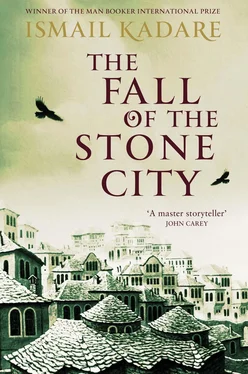Among the scattered houses of outlying neighbourhoods fresh news was slow to arrive so people made do with the old. Even an hour later they were still arguing about machine guns making music. Shaqo Bej Kokoboja, who had once found himself on the Prussian — Russian front by mistake, said that all this talk was nonsense: he had felt the bullets of a Schwarzlose machine gun on his own back and its sound was as familiar to him as his old lady’s snoring. When others retorted that nobody was talking about those old First World War blunderbusses but about Schubert — ever heard of Schubert? — he lost his temper. “Give over, all those Schuberts or sherbets are just popguns. Don’t tell me a machine gun can do a foxtrot or a cannon can play an opera.”
In one of these isolated houses a dinner was recollected from the distant past. Its memory had been preserved down the generations like a legend or a children’s bedtime story. The tale concerned the master of a house who was bound by a promise to invite a stranger to dinner. He handed the dinner invitation to his son with instructions. The son set off in search of an unknown passer-by but became frightened on the lonely road. Passing the cemetery, he threw the invitation over the wall and ran through the darkness, not knowing that the invitation had fallen on a grave. He returned home and said to his father, “I’ve done what you told me.” At that moment there appeared at the door the dead man with the invitation in his hand. The father and his family shrank back in horror. “You invited me and I’ve come,” said the dead man. “Don’t stare at me like that!”
Meanwhile, the dinner at Dr Gurameto’s continued. Nobody knew what was happening inside the house until news of a different kind spread, this time as welcome as an April breeze. It floated gently, more delicate than a rainbow, vulnerable to the slightest current. The irresistible wind from the Gorge of Tepelene seemed to help carry it to its proper destination: the hostages were being freed.
The news was breathtaking; people could not get it into their skulls. The hostages were. . the hostages were not being shot, but released. They had not fallen, shredded by bullets in the city square. They were slipping away, one by one, each to their own home. Oh God! It was Big Dr Gurameto who had performed this miracle!
The wave of gratitude towards him was uncontainable. Hearts melted, knees gave way, heads bowed. The heads then lifted to raise a proper cheer for Big Dr Gurameto. Never before had the mania for comparison, exalting one at the expense of the other, undergone such a reversal. The whole city felt bound to fall to its knees before Big Dr Gurameto, to wash his feet with tears and beg pardon for having doubted him. At the same time it was obliged to turn against his rival, the little doctor, this Judas of Europe and the continent’s disgrace, who had rejoiced prematurely at their hero’s downfall.
The little doctor was mystified. He and his supporters understood nothing of what was going on. Little Dr Gurameto had never nurtured any ill will against his colleague, and had always shown him every respect. But this in no way affected the violent movement of the barometer, which seemed to put paid to every nagging suspicion and conclude this long history of carefully hidden rivalry.
After settling accounts with Little Dr Gurameto, people returned, as was to be expected, to the central issue. As they gazed adoringly at Big Dr Gurameto’s brightly lit house, the music coming from it sounded divine and the ancient building itself resembled less a house than a cathedral.
The old curiosity about the secrets of the city’s ladies now quietly revived, if feebly after such a long abeyance. Was it true that Mrs Gurameto and her daughter were waltzing with the Germans, whose commanding officer, Baron von Schwabe, wore a mask?
This curiosity was bound sooner or later to settle again on the first, unavoidable question. What was this occasion really about? Some still called it the “dinner of shame” but others referred to it as the “resurrection dinner”. The secret was finally coming out, conveyed through mysterious channels, perhaps carried by servants or the dispatch riders who came and went all night.
And what happened was this: on the afternoon that preceded the dinner, after the tanks and armoured vehicles had rumbled and rattled their way into the town, there stepped out from one of the military cars onto the city square Colonel Fritz von Schwabe, commander of the German division and bearer of the Iron Cross. His legs still stiff, he stood surveying the scene and announced, “Gjirokastër. I have a friend here.”
His aides thought he was joking but the colonel went on in the same tone of voice, “A great friend, from university, my closest friend, more than a brother to me.”
His aides expected laughter to follow this statement. “I was joking,” he would surely say, and explain himself.
But nothing of the sort happened. On the contrary, he gave his aides a look of the kind they had never seen and told them his friend’s name. He mentioned the college in Munich where they had studied together and his address. “Big Dr Gurameto. Der grosse Doktor Gurameto, 22 Varosh Straße, Gjirokastër, Albanien.”
The aides heard their commander order this Albanian to be found and brought to him at once.
Four soldiers mounted two motorcycles with sidecars. Armed with machine guns, they sped off with the address of the man they were looking for.
At this point the town’s inhabitants still had not emerged from the shelters, so nobody saw the soldiers knock at Dr Gurameto’s gate and escort him away.
At the city square the colonel’s aides finally believed what he had told them, but as they noticed how anxiously he waited for the man he claimed to be his friend, their suspicions were roused again. Was he really a great friend, closer than any brother, or someone wanted for arrest? They waited to see whether this famous doctor would be given a medal or shot for some crime, of what sort nobody could say.
The motorcycles returned, first one, then the other. All eyes were now focused on the mysterious doctor. Apparently the man would be neither decorated nor executed. This was something harder to credit: a sentimental reunion, as if from the last century or even the age of chivalry.
At first the doctor stood nonplussed and failed to recognise his college friend. Perhaps it was the passage of time, his military uniform or the two scars on his face. But then the meeting went as it should.
The doctor and the colonel embraced and their tears of emotion finally dispelled every shred of doubt. Such a touching encounter, so. . no, no, it couldn’t be of that kind. Neither of them seemed that sort. And yet there was something behind this. Colonel von Schwabe, although young and of relatively modest rank, had strong connections in Berlin, the capital of the Reich. He might know things that nobody else did, for instance that this doctor was about to be appointed the governor of Albania.
The emotional reunion continued, as touching as the discovery of a lost brother in an old ballad.
“Like the Nibelungenlied , eh? Or the Kanun of Lekë Dukagjini ? Do you remember what you told me in the Widow Martha’s Tavern? About Albanian honour, hospitality?”
“Remember it? Of course I do!” Big Dr Gurameto replied. He was overcome by nostalgia too, but now and then an inexplicable shadow crossed his face.
The colonel also looked pensive.
“I’ve dreamed of this meeting for so long,” he said. “I used to talk to people about you and the things you told me. I used to read Karl May’s adventure stories about Albania. People thought I was crazy. They didn’t know how close we were. You know, when I believed I was on my deathbed I thought of you. I even had the delusion that it wasn’t our military surgeon operating on me, but you. Do you remember telling me about that terrifying dream you had, in which you were operating on yourself? I dreamed that you were operating on me. The instruments were in someone else’s hand, but I dreamed it was you who restored me to life. You brought me back from the grave.”
Читать дальше












